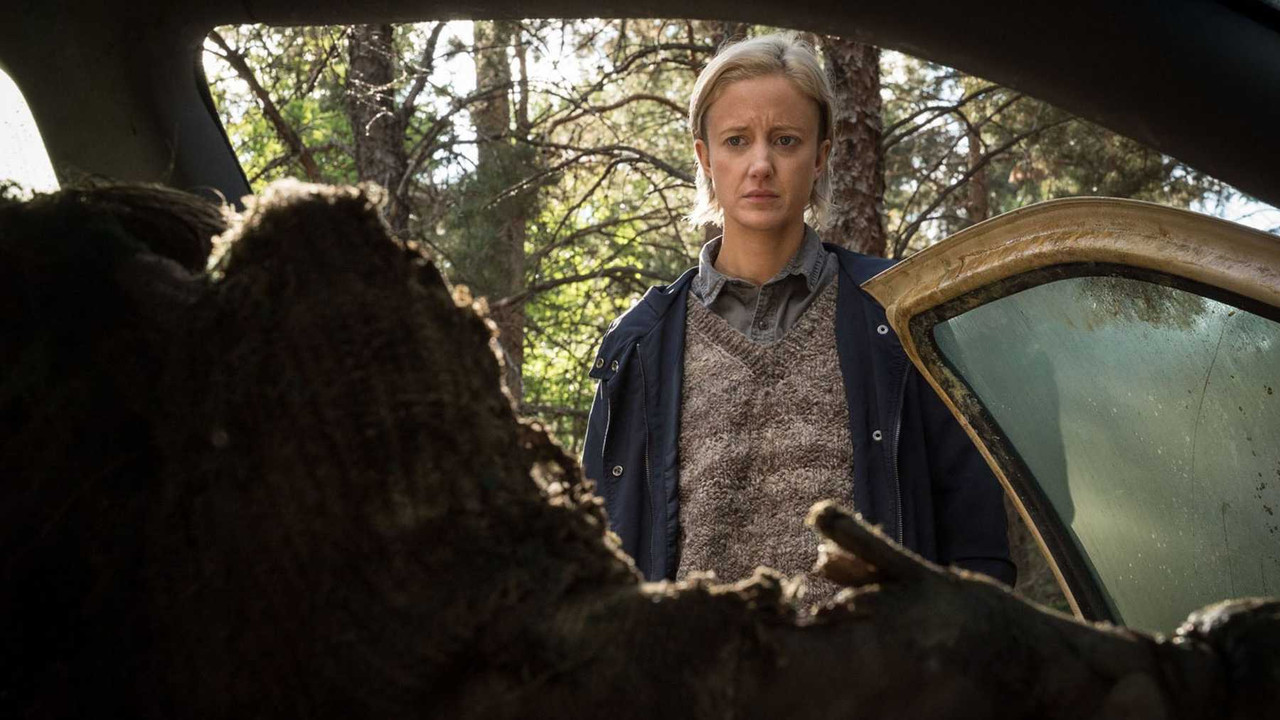Dir: Nicolas Pesce
Horror moves in cycles. I really thought the Japanese ghost girl had been consigned to history, but here we are in 2020 and she’s back, once again in the form of a remake of Takashi Shimizu’s bafflingly popular Grudge series.
There are, to be fair, reasons for optimism. This is the third, and easily the highest-profile, film from director Nicolas Pesce. His first two—The Eyes of My Mother and Piercing—were each among the most visually striking horror films of the past five years, evidence of a genuinely exciting voice who, in Piercing, filtered Ryu Murakami's novel through Argento, but shot with a striking formalism and fashioned those influences into something perverse, funny, creepy and genuinely all its own. There is also the presence of British actress Andrea Riseborough; a performer of formidable natural gifts who should be a star, and might be but for her often terrible nose for screenplays.
Riseborough plays Muldoon, a cop who, following the death of her husband, has recently moved to a small town with her young son. With her new partner Goodman (Demian Bichir) she is assigned to a dead body found in a car. Discovering that the body is that of a woman who went missing from a house where an entire family previously died violently, she goes to investigate. After she leaves the house she can’t shake the feeling that something has followed her.
Splitting his narrative into three strands, set in 2004, 2005 and 2006, Pesce has plenty of plot to unfold (much of it, in the 2006 story, told largely unbidden to Muldoon by a character we’ll simply call ‘Exposition Cop’), but that’s not to say that he finds any new ideas here. The stories don’t really join up. We get no sense of what initially brought the spirit from Japan to this house. Despite setting up a couple of interesting ideas around possible deaths, be it a couple’s (John Cho and Betty Gilpin) option to abort a baby that is likely to have birth defects or a long married couple (Lin Shaye and Frankie Faison) looking into assisted suicide for the cancer stricken wife, the writer/director does nothing to tie these ideas into the film’s threat.
Pesce displays so little interest in the why of the ghostly presence that we never have any idea of what the scares mean. Is this a vengeful presence? If so what does its vengeance mean when taken out on the random people who happen to move into this house? Does the presence simply want the house to itself? This doesn’t seem like the answer, because the film implies that further victims are also tied to the house. These questions aren’t particularly novel or interesting, and nor are the prospective answers, but at least attempting to answer them would give the film something to be about.
As it is, Pesce works his way, seemingly wearily, through the playbook. Things go creak, things go boo, things grab at people from bathtubs full of dirty water, long haired girls stand menacingly with their hair over their faces. For the most part, the film looks drab. It has none of the sharp lines, inventive framing or stylistic verve of either of its director’s previous films. The last ten minutes bring a handful of shots, most notably some violence that looks like it’s out of a graphic novel, framed against a window with stained-glass detailing, that feel like they find Pesce firing on at least a few cylinders. Otherwise, this is the most complete subsuming I've seen for years of a promising director’s personality beneath the mediocrity of a project.
The supporting cast are, to their credit, trying. Lin Shaye and Frankie Faison are an interesting enough pairing and the basics of their backstory are touching enough that you wish that this couple could have been characters in a different movie, and John Cho and Betty Gilpin’s story has similar promise, one scene, of the two of them on the phone discussing whether to keep their baby suggests, like Shaye and Faison’s story, a more interesting film we could be watching. Unfortunately, both of these storylines are interrupted at regular intervals by rote jump scares, because this is a Grudge movie and the wheels of the Scare O Matic must turn.
The main storyline is the weakest section of the film. Riseborough and Bichir have no chemistry, build no relationship we can invest in, and both seem like deeply substandard cops (the plot point of Goodman having ‘investigated’ a previous case in the haunted house without ever entering it is risible). The investigation narrative goes nowhere, the flashbacks to the past of the house are never triggered by anything Muldoon or Goodman do. This is painfully lazy screenwriting, simply neglecting to do the most basic of jobs. This also applies to the depiction of Muldoon’s son (John J. Hansen), who is such an afterthought that the movie forgets about him for ages, then, to remind us he exists, inserts an otherwise purposeless scene of Muldoon bringing him to work, Goodman gives him 48 Hours to watch, then the scene ends. It does nothing within the narrative and doesn’t even have the excuse of being funny to fall back on.
For me, the entire ghost girl sub-genre was always difficult to take seriously, and after Sion Sono’s wicked parody Exte (which also works as maybe the best and creepiest ghost girl film I’ve seen), it seems even more redundant. This umpteenth revisitation of The Grudge does nothing to change that. Sadly, the only thing of note it manages is tarnishing the reputation of one of horror’s most talented and promising young filmmakers.
★



No comments:
Post a Comment